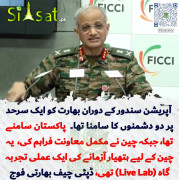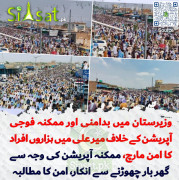A
Admin
Guest
Pakistans shameful and oppressive custom - slaves of the kiln
Slaves of the kiln
Tue, 06 Oct 2009 15:53
Every night, Shah Muhammad dreams of paying back a loan and freeing himself from the employ of a Pakistani brick kiln owner, but instead his debt mushrooms with each day that passes.
Muhammad (68) has a large family, yet no matter how hard they toil in the scorching sun and dirt of Pakistan's Punjab province, he cannot keep up with the medical bills, food costs and other expenses.
"I start work before dawn and stop when the sun disappears... only to wait for another day to make bricks I pledged to make against the loan I took," said Muhammad, who initially borrowed 200 000 rupees two years ago.
He is among perhaps several million Pakistanis under bonded-labour: poor families who accept cash advances from landlords, but in return are expected to work, often for no wages, from morning until nightfall.
Human beings treated like commodities, the bonded-labourer can then be sold on to another employer in what activists decry as modern-day slavery.
Bare-chested and wearing just a cotton sarong around his waist, Muhammad sweats as he moves fast to prepare the bricks, his bones visible in his thin, clay-caked body.
Muhammad said that under the initial terms of his loan, he was told he would get 450 rupees for every 1000 bricks he crafted, making about 900 rupees a day at the kiln five kilometres from Islamabad.
But his boss backtracked on his initial offer and now pays 350 rupees for 1000 bricks, with 100 rupees disappearing to pay off the snowballing loan, with more money borrowed for health care, family weddings and funerals.
'Work until I die'
"This is my life... work, work and work until I die. And when I will die my son will have to work for his whole life to pay his and my loans," he told AFP.
Families trapped in the bonded agreement all work together, the men and women preparing the clay and making bricks while the children gather them and ferry the building materials in the hazardous kiln area.
A study by the Bonded Labour Liberation Front Pakistan (BLLFP) a group of charities working to help the labourers estimates 4.5 million brick kiln workers are victims of this illegal custom.
There are no official statistics, but other researchers say the total number in bonded labour is around 2.6 million, with 1.8 million in agriculture.
The government passed a law in 1992 outlawing bonded labour, but there is little sign of the law being honoured. In the feudal Pakistani countryside, landlords enjoy immense political clout and financial strength.
"Any kiln owner engaging labourers in a bonded agreement will face a minimum of two years punishment or 50 000 rupees fine, but it has never been imposed on any violator," said Syeda Ghulam Fatima, the chairperson of BLLFP.
Pakistan's government says laws regarding kiln labourers are under review.
"We are working to improve the legislation and will assess the ways of implementation once we complete this process, which is expected in six months," said federal Labour Minister Syed Khurshid Shah.
Some bonded-labourers manage to escape, with help of activists or police.
Courage Town
In southern Sindh province, a community of freed labourers live in a settlement known as Himatabad, which means Courage Town.
"We call it Himatabad because it needs a lot of courage to free oneself from influential landlords," said Lalee, a former bonded-labourer turned activist. "Starting a new life is itself a gigantic task."
Lalee escaped the clutches of a landowner in 1987, when she was 24, and has since battled to free others, allowing them to start afresh in the vast arable land that surrounds Himatabad.
"I have dedicated my life to get the lives of my fellow peasants better," said Lalee, an illiterate and low-caste Hindu woman.
But for the handful of success stories like Lalee, there are countless others still toiling for a pittance and others separated from their families.
"Some of them got freed, but most are still enslaved," said Lalee.
Lacho, a middle-aged woman, was rescued from debt-bondage about three years ago, but her husband disappeared in an earlier bid for freedom.
"One night we tried to escape but the armed men caught us and mercilessly tortured us and then separated my husband Lalio from us," she said.
Manoo Bheel said his mother, wife, two daughters, two sons and a brother were kidnapped by a landlord a decade ago, and he has not seen them since, despite taking his case to the courts.
"I'll continue my struggle till our family is reunited," he said.
http://news.iafrica.com/features/1960160.htm
Slaves of the kiln
Tue, 06 Oct 2009 15:53
Every night, Shah Muhammad dreams of paying back a loan and freeing himself from the employ of a Pakistani brick kiln owner, but instead his debt mushrooms with each day that passes.
Muhammad (68) has a large family, yet no matter how hard they toil in the scorching sun and dirt of Pakistan's Punjab province, he cannot keep up with the medical bills, food costs and other expenses.
"I start work before dawn and stop when the sun disappears... only to wait for another day to make bricks I pledged to make against the loan I took," said Muhammad, who initially borrowed 200 000 rupees two years ago.
He is among perhaps several million Pakistanis under bonded-labour: poor families who accept cash advances from landlords, but in return are expected to work, often for no wages, from morning until nightfall.
Human beings treated like commodities, the bonded-labourer can then be sold on to another employer in what activists decry as modern-day slavery.
Bare-chested and wearing just a cotton sarong around his waist, Muhammad sweats as he moves fast to prepare the bricks, his bones visible in his thin, clay-caked body.
Muhammad said that under the initial terms of his loan, he was told he would get 450 rupees for every 1000 bricks he crafted, making about 900 rupees a day at the kiln five kilometres from Islamabad.
But his boss backtracked on his initial offer and now pays 350 rupees for 1000 bricks, with 100 rupees disappearing to pay off the snowballing loan, with more money borrowed for health care, family weddings and funerals.
'Work until I die'
"This is my life... work, work and work until I die. And when I will die my son will have to work for his whole life to pay his and my loans," he told AFP.
Families trapped in the bonded agreement all work together, the men and women preparing the clay and making bricks while the children gather them and ferry the building materials in the hazardous kiln area.
A study by the Bonded Labour Liberation Front Pakistan (BLLFP) a group of charities working to help the labourers estimates 4.5 million brick kiln workers are victims of this illegal custom.
There are no official statistics, but other researchers say the total number in bonded labour is around 2.6 million, with 1.8 million in agriculture.
The government passed a law in 1992 outlawing bonded labour, but there is little sign of the law being honoured. In the feudal Pakistani countryside, landlords enjoy immense political clout and financial strength.
"Any kiln owner engaging labourers in a bonded agreement will face a minimum of two years punishment or 50 000 rupees fine, but it has never been imposed on any violator," said Syeda Ghulam Fatima, the chairperson of BLLFP.
Pakistan's government says laws regarding kiln labourers are under review.
"We are working to improve the legislation and will assess the ways of implementation once we complete this process, which is expected in six months," said federal Labour Minister Syed Khurshid Shah.
Some bonded-labourers manage to escape, with help of activists or police.
Courage Town
In southern Sindh province, a community of freed labourers live in a settlement known as Himatabad, which means Courage Town.
"We call it Himatabad because it needs a lot of courage to free oneself from influential landlords," said Lalee, a former bonded-labourer turned activist. "Starting a new life is itself a gigantic task."
Lalee escaped the clutches of a landowner in 1987, when she was 24, and has since battled to free others, allowing them to start afresh in the vast arable land that surrounds Himatabad.
"I have dedicated my life to get the lives of my fellow peasants better," said Lalee, an illiterate and low-caste Hindu woman.
But for the handful of success stories like Lalee, there are countless others still toiling for a pittance and others separated from their families.
"Some of them got freed, but most are still enslaved," said Lalee.
Lacho, a middle-aged woman, was rescued from debt-bondage about three years ago, but her husband disappeared in an earlier bid for freedom.
"One night we tried to escape but the armed men caught us and mercilessly tortured us and then separated my husband Lalio from us," she said.
Manoo Bheel said his mother, wife, two daughters, two sons and a brother were kidnapped by a landlord a decade ago, and he has not seen them since, despite taking his case to the courts.
"I'll continue my struggle till our family is reunited," he said.
http://news.iafrica.com/features/1960160.htm






































